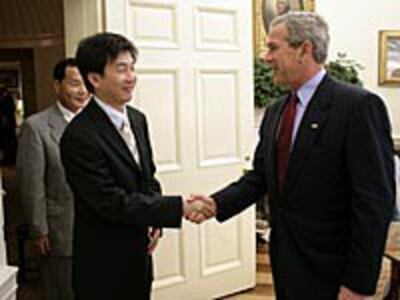
WASHINGTON—A North Korean defector who survived 10 years in Kim Jong Il’s gulags and published a book about it says he urged U.S. President George Bush to press China to stop forcibly sending defectors back to certain punishment at home.
“I was surprised that President Bush's first question to me was, ‘What would you do as the U.S. President for North Korea?’” Kang Chol Hwan, journalist and director of the Democracy Network Against North Korean Gulag, told RFA’s Korean service after a 40-minute White House session this week. “I thought his question was to get an idea how to help North Koreans.”
"I told the president that the North's nuclear issue is very important considering its implications… but to the people in the North, that is only priority number three. The first priority is the North Korean defectors," Kang, author of The Aquariums of Pyongyang: Ten Years in the North Korean Gulag, said.
North Koreans in hiding
“The second priority issue is North Korea's camps for political prisoners, where so many people are dying. I think with international cooperation this urgent issue of… must be resolved,” Kang said.
Because of North Korea’s chronic and worsening food shortages, he said, “many North Koreans escape the country, risking their lives, [and fleeing] into China. Many are arrested and forcibly repatriated. I think this can stop if the U.S. government would make a little more effort.”
Nongovernmental groups claim that up to 200,000 North Koreans could be hiding in China, where they live in constant fear of apprehension and repatriation and in many instances are subject to extreme exploitation. The U.S. State Department sets the number of North Korean defectors in China at 30,000 to 50,000.
“The third priority I think is the North's nuclear [program]…But without solving the defectors' problem [and the] human rights problem, the North's nuclear problem would be difficult to resolve.”
White House endorsement
Bush recently read Kang’s book and is said to have handed out copies to key aides. Vice President Dick Cheney and National Security Adviser Steve Hadley also attended Bush’s meeting with Kang.
I told the president that the North’s nuclear issue is very important considering its implications… but to the people in the North, that is only priority number three. The first priority is the North Korean defectors.
"I didn't know the president had read my book in detail,” Kang said. “He recommended his book to his top officials at the meeting and asked them if they have read.” Some said they had read half and one said he had finished it, he said.
It seemed to me he’s thought a lot more about North Korea's human rights after reading my book—he said it was tremendously heartbreaking that so many pregnant women and children are starving, not only in the camps but all across North Korea.”
On efforts to restart six-party talks on neutralizing North Korea’s nuclear threat, Kang said most defectors don’t believe North Korean leader Kim Jong Il will ever willingly dismantle his nuclear program.
“The urgent matter to resolve should be the human rights issue, especially under the circumstances where individuals' lives are at stake, and many are persecuted,” Kang said.
Human rights is “more than a national issue—it crosses borders. The Bush administration should pay attention to human rights as well as North Korea’s nuclear programs.”
Kang was arrested in 1977 at the age of 10 and sent with his family to the Yodok prison camp, where he was forced to eat rats, cockroaches, and snakes to survive.
The family was arrested after Kang’s grandfather disappeared; he was later tried as a traitor to the nation. Kang’s book was published in English in 2001.
